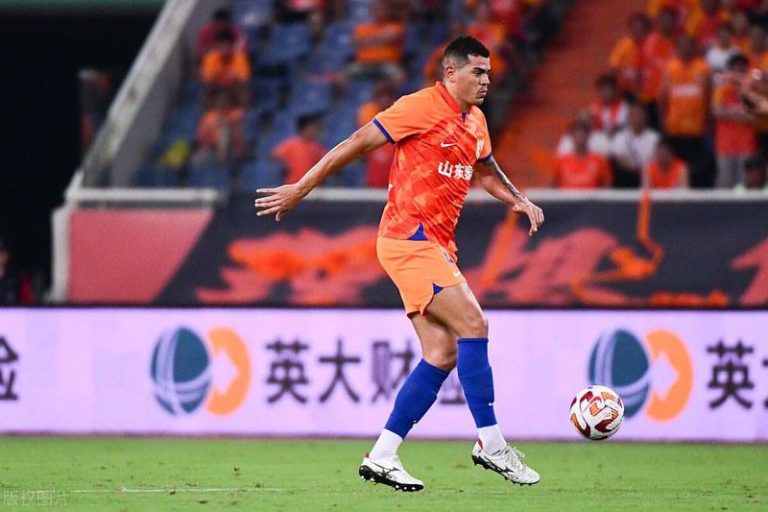Brazilian defender Jadson has been achieving a lot in his career. At 31-years-old, he has been in China since leaving Vasco da Gama in 2020, but his life had ups and downs before allowing him to become a professional footballer.
The player almost gave up. He had to work as a mason in order to pay the bills and could only play football in várzea, which is how the amateur leagues are known in Brazil.
“For almost two years working as a mason. It was a complicated time, I worked a lot and earned a small amount and it was difficult to support my family. I played in várzea only on weekends, but I knew that this would be a phase where everything would work out. I even thought about giving up, but my family, especially my wife, has always been my biggest motivation,” he tells Sambafoot.
READ MORE
++ Fernando Diniz announces his first call-up as Brazil coach
++ Who is the Panamanian player who stands out in the youth categories of a traditional team from São Paulo?
++ Neymar’s new club holds record for titles in Saudi Arabia
****
Jadson, it’s been almost ten years since you switched from lowland football to professional football and things worked out. How was it for you to experience all this? Did it take a while for the penny to drop?
It was a time of change, but everything I achieved tells me to look back and feel proud. Being able to be champion in China and Portugal, giving my family a better life. It is true that not everything was easy, like the Covid-19 pandemic, but with a lot of work and faith, I achieved my goals.
When did you see that things would work out?
Things started to change when I started to have good performances in Fut7. There, I received an invitation to audition at América, in 2014. Unlike today, when kids arrive still small and build a whole base, I turned professional at an advanced age. I needed to make up for all the lost time.
You already said that you are very proud to have played for Vasco, despite playing five games. What did that mean to you there? Was it the realisation of the dream you worked so hard for?
I left Vasco undefeated. There were five games, three wins and two draws. Unfortunately, the year did not end the way fans would have liked. But I am very proud to have defended the colours of a giant club.
In China, you arrived at this time of the pandemic. What was it like going through all that in a totally different country? Did you already speak the language?
It was indeed a very difficult time. I arrived in Wuhan in early 2021 and the pandemic was on the rise. I won’t deny that I was afraid, but it was the opportunity to change my life.
Did anyone help you at that time? Did you get to travel with your whole family or did you spend time alone to adapt?
I was accompanied by Ademilson, who is also Brazilian. He was fundamental for my adaptation. I’m very grateful.
You won three major trophies last season, goal in the final and all. Is there already something of idolatry out there? How is this relationship between the fans and the players?
I feel very dear to the country, yes. Tournaments in China are competitive and I came here looking for titles. I managed to win three titles, including scoring a goal in the final. The Shandong Taishan fans are passionate, they come to the stadium and cheer a lot with the team.
You even have this characteristic of a top scorer. From what I’ve read, you’ve already stated that you didn’t make a base like other athletes. So how did you manage to perfect that goalscoring side?
My focus is always to perform as well as possible in the defensive system, but I also try to score my little goals (laughs). As I said, I scored the goal in the Chinese Cup final and it was a great joy. This season I’ve also been doing my part up front. I scored three goals. I think an athlete needs to be ready for every situation on the field. Of course there is the priority. My case is the defensive sector, but when I have the opportunity up front, I will take advantage of it.
I am also from the Northeast of Brazil and I know how difficult it is for people here, regardless of profession, to be successful when they leave their homes. Does this symbolise something to you? How are your visits to your home?
You know all my connections with Rio Grande do Norte, but I also have the influence of the Southeast. We receive family members at home, always on vacation. But as I’ve been away for many years, we don’t have the habit of receiving people, it’s not common in Europe. We are closer to Brazilians who live with us. There are no big events like it is known in Northeastern culture, for example.
Today, the Chinese market is not the same powerhouse it was a few years ago. This has changed a bit especially in recent years and now with Saudi Arabia’s entry into the big name market. What is the football scene there? Do you believe that there should be a decentralisation of Europe and more going to these other markets?
The landscape has changed, right? But there is still a lot of money involved, many athletes at stake. There is a reduction in the Chinese government’s investment in football, especially after the pandemic. But there is still a lot of strong power and a chance for growth. I don’t see it as a decentralisation since Europe is very traditional, the leagues are stronger. It is still a process that, if it occurs, will take time.



